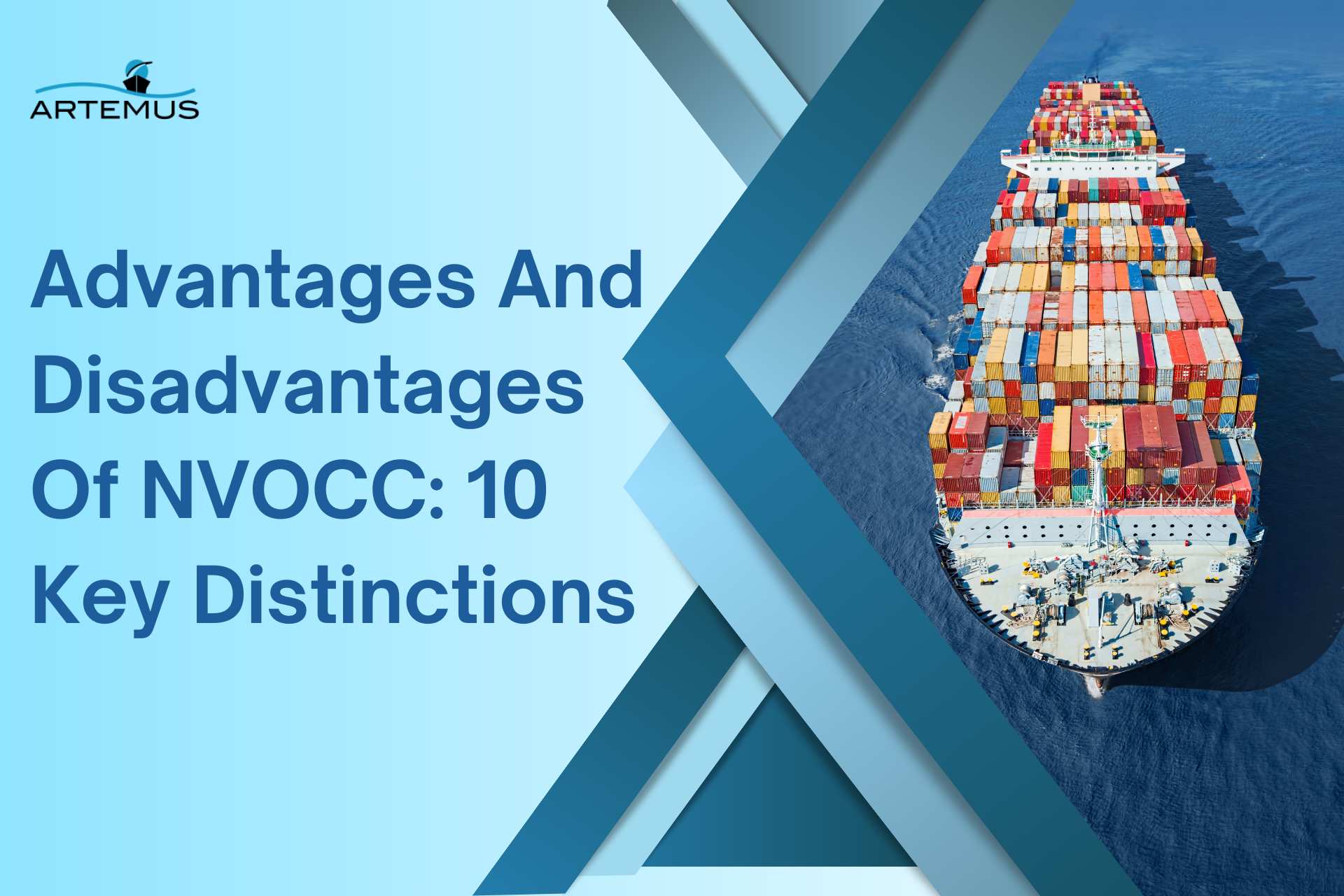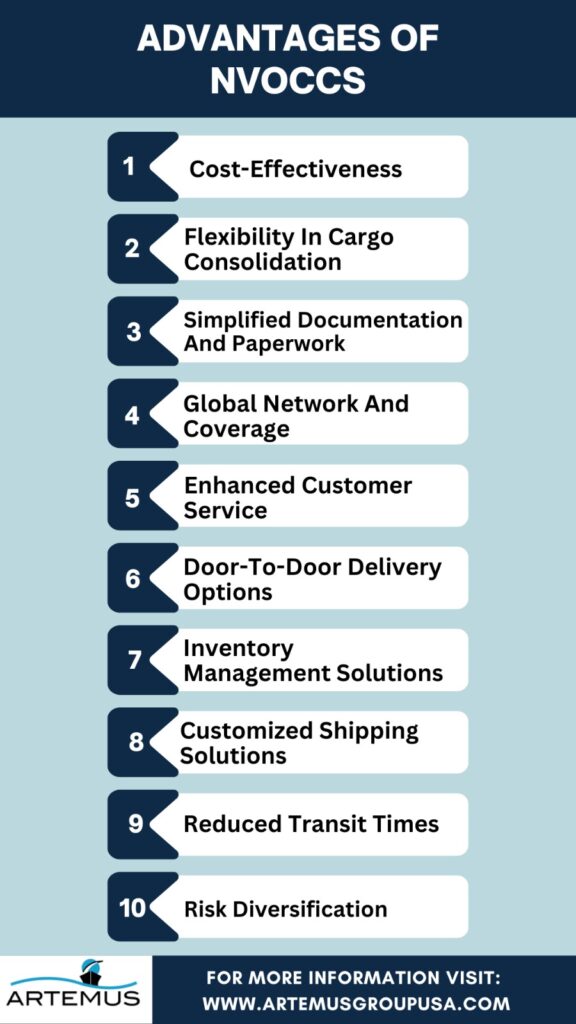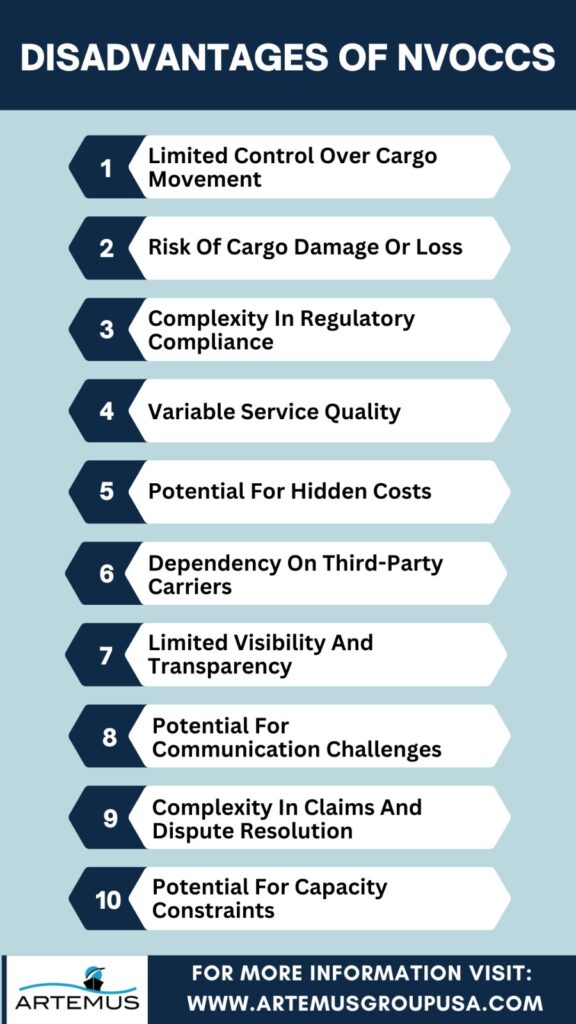
What Is Inbound Logistics & Outbound Logistics? A 2025 Guide
In the dynamic world of supply chain management, understanding the nuances of inbound and outbound logistics is crucial for operational

Navigating the complex waters of international shipping demands a nuanced understanding of the various logistics options available. Among these, Non-Vessel Operating Common Carriers (NVOCCs) stand out as key players in facilitating global trade. In this blog, we delve into the advantages and disadvantages of leveraging NVOCC services, shedding light on how businesses can harness their potential while navigating potential pitfalls.
As we explore the intricacies of NVOCC operations, it’s essential to highlight tools and solutions that streamline compliance processes. Artemus Transportation Solutions offers cutting-edge NVOCC software tailored for ISF (Importer Security Filing) compliance. With Artemus, businesses can seamlessly integrate ISF filing into their logistics workflows, ensuring regulatory adherence and operational efficiency in the ever-evolving landscape of international trade.
Table Of Contents
Non-Vessel Operating Common Carriers (NVOCCs) play a significant role in the global shipping industry, offering both advantages and disadvantages to shippers and logistics companies alike. One of the primary advantages of using NVOCC services is their ability to provide flexible shipping solutions. By consolidating smaller shipments into larger containers, NVOCCs can offer cost-effective transportation options for businesses of varying sizes.
However, despite their benefits, NVOCCs also present certain drawbacks that warrant consideration. One notable disadvantage is the potential lack of direct control over the shipping process. Unlike traditional carriers, NVOCCs do not own vessels, which means they rely on third-party carriers for actual transportation. Consequently, this dependency may lead to challenges in maintaining visibility and accountability throughout the shipping journey, potentially resulting in delays or miscommunications.
Here’s a detailed content covering 10 advantages and disadvantages of NVOCC

Non-Vessel Operating Common Carriers (NVOCCs) play a vital role in the global shipping industry, offering several advantages to both businesses and individuals involved in international trade. Here are some key benefits of using NVOCC services:
NVOCCs often offer cost-effective solutions for shipping goods compared to traditional shipping methods. By consolidating cargo from multiple shippers into full container loads (FCLs), NVOCCs can negotiate better rates with ocean carriers. This cost-saving advantage is particularly beneficial for small and medium-sized businesses with limited shipping volumes.
One of the significant advantages of NVOCCs is their ability to consolidate cargo from multiple shippers. This allows businesses to ship smaller quantities of goods without needing to fill an entire container. NVOCCs can efficiently optimize container space, reducing the overall shipping costs for individual shippers.
NVOCCs streamline the documentation and paperwork process for shippers. They handle various administrative tasks, including booking cargo space, preparing shipping documents, and managing customs clearance. By outsourcing these responsibilities to NVOCCs, shippers can save time and resources, focusing on their core business activities.
NVOCCs typically have extensive networks and coverage, offering access to diverse shipping routes and destinations worldwide. This global reach enables businesses to ship their goods efficiently to international markets, reaching customers across continents. NVOCCs leverage their network to provide comprehensive logistics solutions tailored to the specific needs of each shipper.
NVOCCs prioritize customer service, offering personalized solutions and responsive support to shippers. They work closely with clients to understand their shipping requirements and provide tailored services to meet their needs. NVOCCs offer end-to-end logistics support, from cargo booking to final delivery, ensuring a seamless shipping experience for their customers.
Many NVOCCs offer door-to-door delivery services, managing the entire shipping process from pickup to final destination. This comprehensive service eliminates the need for shippers to coordinate with multiple parties, simplifying the logistics chain and reducing the risk of delays or errors.
Some NVOCCs offer advanced inventory management solutions, allowing shippers to track and monitor their cargo throughout the shipping process. These systems provide real-time visibility into inventory levels, shipment status, and delivery timelines, enabling shippers to optimize their supply chain operations and improve efficiency.
NVOCCs offer customized shipping solutions tailored to the specific requirements of each shipper. Whether it’s specialized handling for fragile or perishable goods, temperature-controlled transportation for sensitive products, or expedited shipping for time-sensitive deliveries, NVOCCs can design personalized solutions to meet the unique needs of their customers.
By leveraging their expertise and network resources, NVOCCs can often offer faster transit times compared to traditional shipping methods. They optimize shipping routes, minimize transit delays, and expedite customs clearance procedures, ensuring timely delivery of goods to their destination.
Partnering with an NVOCC can help shippers diversify their shipping risks. NVOCCs manage multiple shipping contracts and carrier relationships, reducing the dependence on a single carrier or shipping route. This diversification strategy minimizes the impact of disruptions such as port congestion, vessel delays, or unforeseen events on the supply chain.
Related: NVOCC Software For Streamlined Compliance & Why You Need It?


While Non-Vessel Operating Common Carriers (NVOCCs) offer several advantages, there are also some disadvantages associated with their services:
Shippers have limited control over the movement of their cargo when using NVOCC services. Since NVOCCs act as intermediaries between shippers and ocean carriers, shippers may experience delays or disruptions due to factors beyond their control, such as vessel schedules, port congestion, or adverse weather conditions.
There’s a cargo damage or loss risk when shipping goods through NVOCCs. Despite rigorous safety measures and handling protocols, accidents, theft, or mishandling incidents can occur during transit, resulting in financial losses for shippers. Shippers need to secure adequate insurance coverage to mitigate these risks.
NVOCC operations are subject to various international shipping regulations and compliance requirements. Shippers must navigate complex legal frameworks, customs regulations, and trade agreements when shipping goods across borders. Failure to comply with these regulations can lead to penalties, delays, or even legal disputes.
Service quality may vary among different NVOCC providers. While some NVOCCs offer reliable and efficient services, others may need more communication, responsiveness, or operational capabilities. Shippers should conduct thorough research and due diligence to select reputable and experienced NVOCC partners.
Shippers may encounter hidden costs or surcharges when using NVOCC services. These additional fees, such as documentation fees, container handling charges, or fuel surcharges, may not be included in the initial shipping quote, leading to unexpected expenses. Shippers should review their contracts carefully and clarify any potential additional costs with their NVOCC provider.
NVOCCs rely on third-party carriers and vessel operators to transport cargo. Shippers depend on these carriers to fulfill their shipping obligations, and disruptions in carrier services can impact the reliability and timeliness of shipments. Shippers should assess the track record and reliability of carriers partnered with their NVOCC provider to mitigate this risk.
Shippers may experience limited visibility and transparency into the shipping process when using NVOCC services. Unlike direct contracts with ocean carriers, where shippers have direct access to shipment tracking and status updates, NVOCCs may not provide the same level of visibility, making it challenging for shippers to monitor their shipments in real time.
Communication challenges may arise when coordinating with multiple parties involved in the shipping process, including NVOCCs, carriers, customs authorities, and freight forwarders. Miscommunications or delays in information sharing can lead to errors, misunderstandings, or disruptions in the shipping chain, affecting the overall efficiency and reliability of shipments.
Resolving disputes or filing claims for cargo damage, loss, or delivery delays can be complex and time-consuming when dealing with NVOCCs. Shippers may encounter challenges in proving liability or obtaining compensation for their losses, especially when multiple parties are involved in the shipping transaction.
During peak shipping seasons or periods of high demand, NVOCCs may face capacity constraints or space limitations on vessels. Shippers may experience difficulties securing cargo space for their shipments, leading to delays or higher freight rates. Shippers need to plan ahead and book shipments in advance to mitigate the risk of capacity constraints.
Related:Customs Compliance Software: Key Benefits & Top Suggestions
Non-Vessel Operating Common Carriers (NVOCCs) play a pivotal role in the global logistics industry, providing essential services for businesses looking to ship goods efficiently and cost-effectively. To maximize the benefits of NVOCC services and ensure smooth and reliable shipping operations, shippers need to adopt best practices in their utilization. Here are some key recommendations:
1. Conduct Thorough Research: Before engaging with an NVOCC, conduct thorough research to evaluate their reputation, track record, and service offerings. Consider factors such as industry experience, financial stability, and customer reviews to ensure you’re partnering with a reliable and reputable provider.
2. Clarify Service Offerings: Communicate your shipping requirements and expectations with the NVOCC to ensure they can provide the necessary services. Discuss aspects such as cargo volume, destination requirements, transit times, and any special handling or documentation needs upfront to avoid misunderstandings later on.
3. Review Contract Terms Carefully: Carefully review the terms and conditions outlined in the contract with the NVOCC. Pay close attention to pricing structures, payment terms, liability clauses, and dispute resolution procedures. Seek clarification on any unclear or ambiguous terms to avoid potential disputes or unexpected costs down the line.
4. Establish Clear Communication Channels: Establish clear communication channels with the NVOCC to facilitate efficient information exchange throughout the shipping process. Designate key points of contact on both sides and ensure timely communication regarding shipment status updates, documentation requirements, and any changes or issues that arise during transit.
5. Provide Accurate & Complete Documentation: Ensure all required documentation, including shipping manifests, bills of lading, and customs paperwork, is accurate, complete, and submitted promptly. Failure to provide proper documentation can lead to delays, fines, or even shipment rejection at ports of entry, so it’s essential to adhere to regulatory requirements.
6. Monitor Shipment Progress: Monitor the progress of your shipments closely throughout the transit process. Utilize tracking and monitoring tools provided by the NVOCC to stay informed about shipment status, location updates, and estimated arrival times. Proactively address any issues or delays that arise to minimize disruptions to your supply chain.
7. Maintain Transparency & Accountability: Maintain transparency and accountability in your dealings with the NVOCC and other stakeholders involved in the shipping process. Keep accurate records of all communications, agreements, and transactions related to your shipments. Foster a collaborative relationship based on trust and mutual respect to ensure successful outcomes.
8. Plan For Peak Seasons & Capacity Constraints: Anticipate peak shipping seasons and capacity constraints to avoid last-minute delays or difficulties securing cargo space. Plan and book shipments well in advance, especially during busy periods, to ensure availability and minimize the risk of capacity constraints impacting your supply chain.
9. Seek Continuous Improvement: Continuously evaluate and assess the performance of the NVOCC and your overall shipping operations. Solicit feedback from stakeholders, analyze key performance metrics, and identify areas for improvement. Collaborate with the NVOCC to implement corrective actions, optimize processes, and enhance efficiency and reliability.
10. Build Long-Term Partnerships: Cultivate long-term partnerships with trusted NVOCC providers based on mutual trust, respect, and shared goals. Invest in building strong relationships and open lines of communication to foster collaboration and innovation. A strategic and collaborative partnership with an NVOCC can provide long-term benefits and contribute to the success of your business.
Related:NVOCC License Requirements: What You Need To Know


Artemus is a cutting-edge NVOCC software solution designed to ensure successful ISF (Importer Security Filing) compliance for businesses engaged in international shipping. With its advanced features and user-friendly interface, Artemus streamlines the process of filing ISF documents, helping companies navigate the complexities of import regulations with ease. By leveraging automation and real-time data validation, Artemus minimizes errors and ensures accuracy in ISF submissions, reducing the risk of penalties and delays associated with non-compliance.
Related:Where Can I Buy A Customs Bond? Understand Your Options
The benefits of NVOCC (Non-Vessel Operating Common Carrier) include cost-effectiveness through cargo consolidation, streamlined documentation processes, and access to global shipping networks, enhancing efficiency and flexibility in international trade.
NVOCCs (Non-Vessel Operating Common Carriers) consolidate and manage cargo from multiple shippers, negotiate freight rates with ocean carriers, handle documentation, provide logistics services, and ensure smooth shipment delivery, acting as intermediaries in the shipping process.
Freight forwarders may face challenges such as limited control over cargo movement, the potential for miscommunication, and dependence on third-party carriers, leading to delays, increased costs, and logistical complications in the shipping process.
A freight forwarder acts as an intermediary between shippers and carriers, coordinating logistics services, while an NVOCC (Non-Vessel Operating Common Carrier) consolidates and manages cargo, negotiates rates, and assumes responsibility for shipping under its bill of lading.

While Non-Vessel Operating Common Carriers (NVOCCs) offer a plethora of advantages such as cost-effectiveness, global reach, and streamlined logistics, businesses must acknowledge and mitigate the associated disadvantages.
From limited control over cargo movement to the potential for hidden costs, navigating the intricacies of NVOCC services requires careful consideration and strategic planning. However, with proper due diligence, clear communication, and the right tools, businesses can leverage the strengths of NVOCCs to optimize their shipping operations and expand their global reach.
Related:NVOCC VS Freight Forwarder: Differences & Who To Choose?

In the dynamic world of supply chain management, understanding the nuances of inbound and outbound logistics is crucial for operational

In today’s interconnected world, businesses rely heavily on global trade to expand their markets, access new resources, and drive growth.

Importing goods for resale in the USA presents a lucrative business opportunity, but navigating the complexities of U.S. customs regulations,
Get In Touch
Artemus’ Software Solutions for ISF, AMS, Japan AFR, eManifest Canada, & Panama B2B filings.
Get In Touch
Artemus’ Software Solutions for ISF, AMS, Japan AFR, eManifest Canada, & Panama B2B filings.